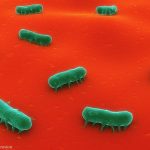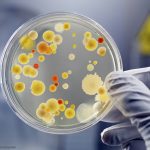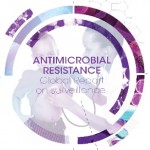This week, House members Rosa DeLauro (D-CT) and Louise Slaughter (D-NY) introduced a bill that would ban antibiotic-resistant strains of Salmonella such as those that have sickened more than 600 people in the ongoing Foster Farms chicken outbreak. The bill would require the USDA to recall meat, poultry, or egg products that are contaminated with bacteria resistant to two or more critically important antibiotics or with bacteria or other pathogens that cause serious illness or death. The bill names Salmonella and Campylobacter as pathogens. Despite Foster Farms products sickening so many people (at least 17,000 with the multiplier), no recall has ever been issued from Foster Farms or the USDA. Seven strains of antibiotic-resistant Salmonella Heidelberg are present in the contaminated … [Read more...]
Scientists Discover Achilles’ Heel in Antibiotic Resistant Bacteria
Scientists at the University of East Anglia may have discovered the Achilles' heel of antibiotic resistant bacteria. The research, published in the journal Nature, has found a defensive barrier that drug-resistant bacteria form around themselves. The gram negative bacteria, which include E. coli, form an impermeable lipid-based outer membrane that protects the organisms against attacks by the human immune system and antibiotics. Removing this barrier lets antibiotics kill the bacteria. The study found how the cells transport the barrier's building blocks, lipopolysaccharides, to the surface of the bacteria. Group leader Professor Changjiang Dong said in a statement, "we have identified the path and gate used by the bacteria to transport the barrier building blocks to the outer … [Read more...]
Answers to Questions About Antibiotic Resistance
Food & Water Watch has published a Q&A about antibiotic resistance. According to Food & Water Watch's analysis, the CDC has found that more than 20% of antibiotic-resistant infections are linked to food. The ongoing Foster Farms chicken Salmonella outbreak is comprised of seven different strains of antibiotic-resistant bacteria, which makes those infections hard to treat. The hospitalization rate in that outbreak is almost twice the normal number for a Salmonella outbreak. More than 80% of the antibiotics sold in this country are used in agriculture, and not because animals are sick. Farmers use them so animals will gain weight and to prevent illness in poor conditions. No antibiotics should be given in small doses this way; the bacteria just become resistant to them. And … [Read more...]
Researchers Find Antibiotic-Resistant Bacteria For the First Time in Food
Researchers in Canada have found a certain antibiotic-resistant bacteria for the first time in a food product, which means the risk of exposure is now moving beyond people who travel to certain countries and people who have been hospitalized. The bacteria is resistant to carbapenems, one of the last resort antibiotics in medicine's arsenal. The research has been published in the Center for Disease Control's journal Emerging Infectious Diseases for July 2014. In January 2014, routine testing found a carbapenemase-producing organism in squid that was for sale in a Chinese grocery store in Saskatoon, Canada. Carbapenemases are enzymes that organisms produce that destroy the carbapenem antibiotic. Scientists have found these organisms in the environment and in animals used for food, but not … [Read more...]
CSPI Sues USDA over Antibiotic-Resistant Bacteria Again
A lawsuit filed today by the Center for Science in the Public Interest (CSPI) charges that the U.S. Department of Agriculture is not protecting the public from dangerous antibiotic-resistant strains of Salmonella in poultry an ground meat. The nonprofit wants the court to force the government to respond to a three-year-old regulatory petition CSPI filed to classify antibitoic-resistant Salmoenlla strains as adulterants. The huge Foster Farms chicken Salmonella outbreak is just one such example of this problem. Seven strains of Salmonella Heidelberg have sickened 574 people in the last year. That actually means that more than 17,000 people have been sickened by that contaminated chicken, using the multiplier for Salmonella, which is 30.3. Furthermore, four of those seven strains are … [Read more...]
TATFAR Study on Antimicrobial Resistance Frightening
Foodborne illness resulting from organisms that are resistant to antibiotics is an emerging problem and a facet of a much greater challenge that threatens the health and safety of entire populations. As a result of the threat from Antimicrobial Resistance (AMR), the U.S. Department of Health and Human Services (HHS) and the European Commission formed the Transatlantic Taskforce on Antimicrobial Resistance (TATFAR) and recently issued a report outlining the problems posed by AMR and the goals of the Taskforce intended to address them. Antimicrobial agents, including even the newest and most powerful drugs will, over time, be rendered ineffective, according to the report, “by the remarkable ability of bacteria to become resistant through mutation or acquisition of resistance genes from … [Read more...]
US and EU Report Little Progress in Antibiotic Resistance Fight
There hasn't been much good news about antibiotic resistance lately. A couple of weeks ago, a World Health Organization (WHO) report declared it a "problem so serious that it threatens the achievements of modern medicine." Today, the five-year-old partnership between the U.S. and the European Union (EU) called the Transatlantic Taskforce on Antimicrobial Resistance released its first progress report. But, there isn't much progress to report. The problem is big. In the EU, about 25,000 people die from drug-resistant infections every year. In the U.S. the number of annual deaths is about 23, 000. Thousands more who survive win the battle after lengthy and expensive hospital stays. In the U.S., direct medical costs for treatment of these infections is about $20 billion each year, with an … [Read more...]
Beware the Common House Fly
As anyone who has ever eaten outdoors knows, house flies are very annoying and can ruin a picnic. We've developed methods for controlling them that range from bug zappers to screen shields that cover food. But now there's even more reason for concern. A new study conducted at Kansas State University and published in Applied and Environmental Microbiology has found that flies may be transferring antibiotic resistant bacteria from farms to people. This troubling finding turns flies from a nuisance into a health threat. Since we know farm animals carry antibiotic resistant bacteria, primarily because they are fed sub therapeutic doses of antibiotics for growth promotion and disease prevention, it makes sense that insects could transfer those pathogens to people. And it turns out that … [Read more...]
WHO Issues New Report on Antibiotic Resistance
The World Health Organization (WHO) has issued a new report on antibiotic resistance (ABR). It details resistance to antibacterial drugs in different parts of the world, along with resistance data on specific pathogens such as the resistance of E. coli bacteria to third-generation cephalosporins and fluoroquinolones. The report outlines the health and economic burden due to antibiotic resistance and looks specifically at antibiotic resistance in food-producing animals and the food chain. While antibiotic resistance is growing around the world, WHO says there is no coordinated surveillance effort, which could help monitor the situation and provide clues to fix the problem. The report states that, "major gaps exist in surveillance and data sharing related to the emergency of ABR in … [Read more...]
Cow Manure Has New Antibiotic Resistance Genes
A new study funded by the Swiss National Science Foundation and the U.S. National Institutes of Health found that cow manure harbors diverse new antibiotic resistance genes. This material is commonly used as a farm fertilizer. It's worth noting that produce is one of the main sources of food poisoning in the United States; fertilizer, along with runoff from farms are two of the ways leafy greens and other fruits and vegetables can become contaminated. The study, published in American Society for Microbiology journal, tried to find which antibiotic resistant genes are in cow manure. The scientists used a "screening-plus sequencing" approach and found 80 unique and functional antibiotic resistant genes. Those genes made E. coli bacteria resistant to antibiotics. Researchers found an … [Read more...]












